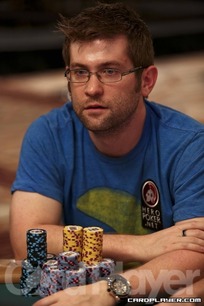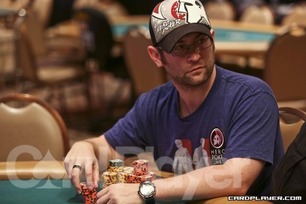






Gavin Griffin -- Poker Questions Asked And AnsweredGriffin Takes On Questions Of All Kinds |
|
|
 People in the poker community often come up to me and ask about whatever is on their mind. Some of these questions are good questions, and some are bad beat stories in disguise. I’ve been through quite a few things in my poker career and I like to help whenever possible, and in this new Card Player series, I’d like to share my experiences and knowledge. Feel free to ask any poker-related question, and I’ll do my best to answer it in the space below.
People in the poker community often come up to me and ask about whatever is on their mind. Some of these questions are good questions, and some are bad beat stories in disguise. I’ve been through quite a few things in my poker career and I like to help whenever possible, and in this new Card Player series, I’d like to share my experiences and knowledge. Feel free to ask any poker-related question, and I’ll do my best to answer it in the space below.
Question: I’m always hearing about practicing proper table selection. Does this happen before you sit down, or do you just change tables when you realize the one you are sitting at isn’t very good? What do you look for when determining how good a table is?
Gavin: Well, I guess this depends on where you play. Some casinos don’t have the game selection that others do. For instance, at the casino I usually play at, there is usually one game per limit and if it’s a popular game like $5-$5 no-limit hold’em, there will be a must move to a main game, sometimes two must moves. If you’re in a bad main game and the must move or the list looks really good, you have to leave the game and wait an hour to get back into the feeder games. In other casinos with more traffic, they might have more games at the same limit and you are free to move within those games, choosing the best one to play in. You can also game select before you sit down by seeing which limit, game type, or game within a limit and game type looks the best and then only getting on those lists.
There are several ways to figure out which games are best. First of all, you should look and see how many people are seeing flops. The more people on average… the better the game. Second, how big are the pots? If there are six people in per flop for a raise and two of them call the flop, then it’s probably a good game. If it’s no-limit that you’re playing, check how big the stacks of the players you know to be poor are. If they’re deep, you probably want to be in that game. If they’re short stacked and they aren’t the type to do very much rebuying, then they probably won’t be there when you change games or get to that game anyways. Finally, are people having fun? In games where people have a good time, the money usually flows a little easier. If you’re playing in a game where everyone is grumpy, stoic, and in their own world, you should probably seek out a different one.
Question: I’m often sitting at a table where most of the players are competent to very good, but there is usually at least one player who has no idea what he’s doing. I know I’m supposed to go after this player and find ways to play pots against him, but that often gets me into trouble against the others. What’s the best way to isolate a bad player?
Gavin: First of all, it seems like you could benefit from reading the above. You should try to find a different game if you can. If that’s not an option wherever you play, try to find a different place to play. If that’s not an option, then first of all, work on becoming a better player so you don’t really have to worry about the other players quite as much. Make them worry about you.
 As far as isolating a bad player, that’s a tricky one. You can flat his raises a little wider, but those other competent players will notice that your flatting range when he raises has widened and they’ll take advantage of that. If you re-raise him wider, they’ll take advantage of that as well. One strategy you could implement if you notice that other opponents are three-betting to take advantage of your wide flat calling range on the bad player’s opens is to tighten up that flat calling range just a little bit, but mostly eliminate your three-betting range so that you can attack the three-bettors with back raises. Or, by just having a much stronger range than they expected, getting paid off when for example… “There’s no way you can have A-K here, you didn’t re-raise.” Be careful to notice when they’ve adjusted to your adjustment though. Really, what you should do is follow my first piece of advice and find yourself a better game to play in or work hard to be the best player in the game so you can mop up all that extra equity.
As far as isolating a bad player, that’s a tricky one. You can flat his raises a little wider, but those other competent players will notice that your flatting range when he raises has widened and they’ll take advantage of that. If you re-raise him wider, they’ll take advantage of that as well. One strategy you could implement if you notice that other opponents are three-betting to take advantage of your wide flat calling range on the bad player’s opens is to tighten up that flat calling range just a little bit, but mostly eliminate your three-betting range so that you can attack the three-bettors with back raises. Or, by just having a much stronger range than they expected, getting paid off when for example… “There’s no way you can have A-K here, you didn’t re-raise.” Be careful to notice when they’ve adjusted to your adjustment though. Really, what you should do is follow my first piece of advice and find yourself a better game to play in or work hard to be the best player in the game so you can mop up all that extra equity.
Question: What was the one concept you learned early in your career that really accelerated your poker progression?
Gavin: There were a few “a-ha” moments in my early development as a poker player. The first of which was that in hold’em, just because your hand is suited and connected, doesn’t mean it’s a good hand. The biggest moments for me came when I was dealing and playing in poker games around the Dallas-Fort Worth area while I was in college. It’s not a concept directly related to poker, but rather a tangential one.
I would deal in this one game that had a core group of players that were good and then some other people who would come in occasionally. The core group would arrive in the afternoon and play for a bit, usually a sit-and-go. When others showed up, they would wind down their game and get into whatever that day’s scheduled game was. Sometimes no-limit, sometimes limit hold’em, sometimes Omaha. I would deal for hours at a time and then the game would break and that same core group would stick around for a while, sometimes playing more, often just talking about poker. They would discuss the sit-and-go they played earlier or talk about some hand that came up during the cash game. All of the time, they were getting different perspectives on how each situation should be played.
I learned from that game and those people that collaboration is a very important part of learning and developing as a poker player. Since then, I’ve noticed that the most successful parts of my poker career all came while I was involved in deep collaboration with other very good players. I was very involved in the earlier days of 2+2, and more recently, I’ve been lucky enough to have actual geniuses to talk to about math, game theory, and poker theory and that has elevated my game tremendously. I would like to think that they have gained some insights from me as well. Being able to learn from and contribute to a community of like-minded individuals is important in the development of almost any skill set, poker notwithstanding.
If you have a question for Gavin, send it to [email protected].
